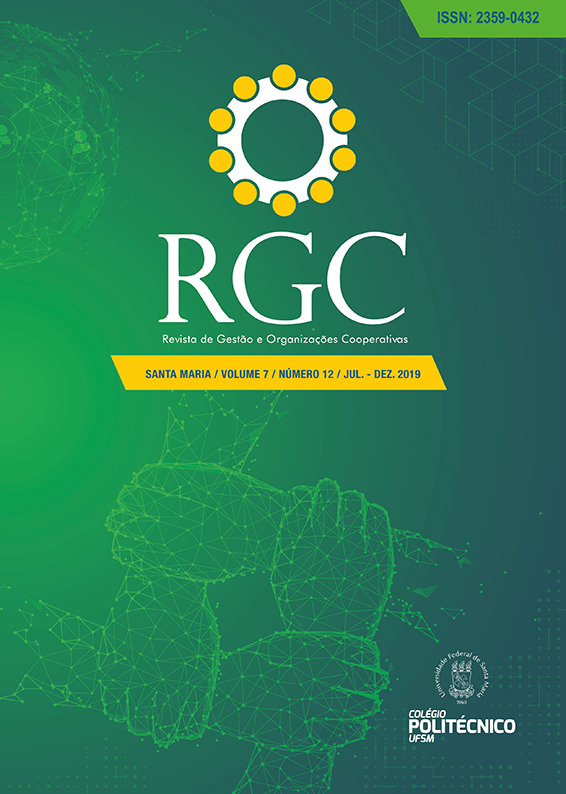Challenges for the expansion of SICOOB of Açailândia/MA
DOI:
https://doi.org/10.5902/2359043233409Keywords:
SICOOB, Credit Union, Challenges, Benefits.Abstract
This article aims to analyze the possible limitations of the expansion of the credit union SICOOB of Açailândia/MA. It also tries to point out possible solutions to better inform the cooperative about the cooperative and the local credit cooperative, as well as its benefits and advantages. With quantitative methodology and interpretative analysis, the results indicate some situations: first, the majority of the members are satisfied financially and in the relationship with SICOOB; Second, greater and better marketing campaigns are needed to make the cooperative better known in society; Third, human resources, such as agents, are key components in the relationship of trust and credibility on the part of associates.Downloads
References
ALVES, Janaina Ferreira. Gestão de Pessoas. São Paulo: Ibmec Educacional, 2011.
BRASIL. Lei nº 5764/71. Política Nacional de Cooperativismo. Brasília. Disponível em:
http://www.planalto.gov.br/ccivil_03/leis/L5764.htm. Acesso em: 05/10/2017.
CHIAVENATO, I. Introdução à teoria geral da Administração. São Paulo: Atlas, 2003.
CHURCHILL, Gilbert A. Jr.; PETER, J. Paul. Marketing: criando valor para os clientes. 2. ed. São Paulo: Saraiva, 2000.
ERLING, Marlos Lopes Godinho. Regulação do sistema financeiro nacional: desafios e propostas de aprimoramento institucional. São Paulo: Almedina, 2015.
FONSECA, João José Saraiva da. Metodologia da pesquisa científica. Fortaleza: UECE, 2002.
FUKUYAMA, Francis. Construção de Estados: Governo e Organização no Século XXI. Rio de Janeiro: Rocco, 2005.
GIL, Antonio Carlos. Como elaborar projetos de pesquisa. 4ª Ed. São Paulo: Atlas, 2002.
KOTLER, Philip; ARMSTRONG, Gary. Princípios de marketing. Tradução: Cristina Yamagami. 12ª Ed. São Paulo: Pearson Prentice Hall, 20007.
KOTLER, P.; KELLER, K. L. Administração de marketing: a bíblia do marketing. 14. ed. São Paulo: Pearson, 2012.
MINAYO, Maria Cecilia de Souza (Org.). Pesquisa Social: Teoria, método e criatividade. 33ª Ed. Petrópolis, RJ: Vozes, 2013.
OCB. Organização das Cooperativas Brasileiras. Agenda Institucional. Coord. Fabíola da Silva Nader Motta. Brasília: Farol Conteúdo Inteligente, 2017.
PAULI, Rafael Camargo. Competências, desenvolvimento e confiança. Curitiba: UFPR, 2012.
Disponível em: http://www.economiaetecnologia.ufpr.br/XI_ANPEC-
Sul/artigos_pdf/a2/ANPEC-Sul-A2-02-competencias_desenvolvim.pdf. Acesso em: 16/11/2017.
PINHEIRO, Marcos Antonio Henriques. Cooperativas de crédito: história da evolução normativa no Brasil / Marcos Antonio Henriques Pinheiro. – 6 ed. – Brasília: BCB, 2008.
PINHO, Diva Benevides. As cooperativas no desenvolvimento do Brasil: passado, presente e futuro - tentativa de síntese. São Paulo: ESETEC, 2008.
SCHALLENBERGER, Erneldo. Associativismo cristão no sul do Brasil: a contribuição da Sociedade União Popular e da Liga das Uniões Coloniais para a organização social e o desenvolvimento sul brasileiro. 2001. 179 f. Tese (Programa de Pós-Graduação em História) – Pontifícia Universidade Católica do Rio Grande do Sul, Porto Alegre, 2001.
SCHNEIDER, J. O. (2012). A doutrina do cooperativismo: análise do alcance, do sentido e da atualidade dos seus valores, princípios e normas nos tempos atuais. Cadernos Gestão Social,
(2), 251-273.
SEBRAE/MA. Cooperativa de crédito: O que é, como funciona e como aproveitar os benefícios desse sistema. Edição: Clara Favilla. São Paulo: Gráfica Ipiranga, 2005.
SOARES, Marden Marques; SOBRINHO, AberlardoD. de Melo. Microfinaças: o papel do Banco Central e a importância do cooperativismo de crédito. 2ª edição revista e ampliada. Brasília: BCB, 2008.
SOUZA, Adriano Maicon. A evolução histórica do cooperativismo. Maringá Management: Revista de Ciências Empresariais. V.4 n.1. Maringá-PR: 2007.
Downloads
Published
How to Cite
Issue
Section
License
Authors who publish in this journal agree to the following terms:
- Authors retain copyright and grant the journal the right of first publication, with work simultaneously licensed under the Creative Commons Attribution License that allows the sharing of work with acknowledgment of authorship and initial publication in this journal.
- Authors are authorized to enter additional contracts separately for non-exclusive distribution of the version of the work published in this journal (eg, publishing in institutional repository or as a book chapter), with acknowledgment of authorship and initial publication in this journal.
- Authors are allowed and encouraged to post and distribute their work online (eg, in institutional repositories or on their personal page) at any point before or during the editorial process, as this can bring about productive change as well as increase impact and impact. citation of published work (See The Effect of Free Access).







